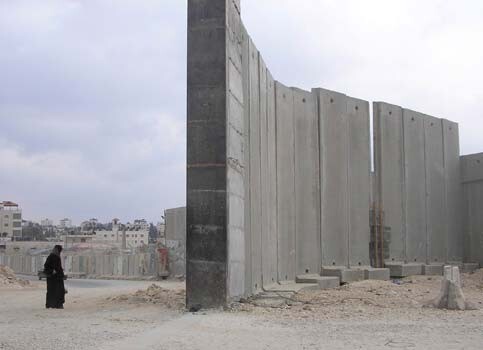12 December 2006

A Palestinian woman approaches Israel’s wall at Al Ram, Jerusalem. (Tom Spender/IRIN)
On December 11, a number of NGO’s sent a letter to Riyadh Mansour Head of the Permanent Observer Mission of Palestine to the United Nations. The letter includes a response to the Report of the Secretary-General pursuant to General Assembly resolution ES-10/15 on the establishment of the UN register of damage in connection with paragraphs 152 and 153 of the advisory opinion of the International Court of Justice of 9 July 2004.
The establishment of a Register should not be the only step the UN takes to implement the ICJ Opinion.
Palestinian civil society welcomes the United Nations Register of Damage caused by the Construction of the Wall in the Occupied Palestinian Territories as a step towards the implementation of the International Court of Justice advisory opinion, but serious concerns remain over the working of the Register. Of particular concern are the purpose of the Register, the deferral of decision-making powers to the Board concerning eligibility criteria, scope of damages and the procedure of registration of claims, as well as the lack of participation of Palestinian victims, civil society and leadership.
Unless these concerns are addressed in a transparent and consultative manner, Palestinian civil society will publicly denounce and actively boycott the Register of Damage.
Purpose of the Register
Although the Register of Damage as envisaged by the Secretary-General is not a claim mechanism, the establishment of a register that does not foresee reparation as a form of redress would be useless for the victims whose rights have been violated. It would also contradict the Court’s conclusion that “Israel has the obligation to make reparation for the damage caused to all the natural or legal persons concerned.” Hence, the inherent purpose of the Register is to lay the foundation for redress.
Registration of claims
The Register, as currently envisaged by the report of the Secretary-General, remains vague on the procedure for approval of claims because decision about eligibility criteria and scope of damages is deferred to the Board. Palestinian civil society is concerned that excessive power to shape the Register is left to the Board, whose composition is yet to be determined. Moreover, the claims registered will not be evaluated or verified by the Board, a procedure which diminishes the relevance of this Register as an official record for future claims.
Eligibility criteria
Equally important is the participation of Palestinian victims, civil society and leaders in the determination of eligibility criteria and the scope of damages as the terms of reference of the Register will directly affect potential beneficiaries. The eligibility criteria need to be flexible and inclusive, considering all available standards of evidence as developed by reparation mechanisms and international law.
Scope of damages
The Register should include not only material damage but also non-material damage.
Similarly, the scope of damages must cover all violations of the rights of Palestinians, as stipulated by the International Court of Justice advisory opinion. The register, as it is currently envisaged, however, omits collective damage claims, such as damage to public lands and natural resources, civil infrastructure, commonly held properties, environmental harm and the destruction of regional economies. It also omits nonmaterial damages such as effects on mental health and family life. As it is currently conceived, the most significant part of damages caused by the Wall would escape the Register’s purview. It is important, therefore, that the Register includes all material and non-material damages as well as collective damages, as human rights standards and international guidelines on reparation have established.
Field presence and participation
Lastly, the Register must maintain a fully functional operation in the occupied Palestinian territories, regardless of where the Board members convene. Furthermore, the UN General Assembly and Secretary General must ensure that, consistent with the Privileges and Immunities Convention, the Register’s Board members and functionaries have protected access to the field and the affected persons, without the interference of any third parties. Without such access, the participation of Palestinian victims and civil society will be seriously impeded.
Based on the above, we urge you to ensure that the Register is conceived as a step against impunity and adheres to the requirements of international law and best practice. Palestinian civil society will cooperate with a Register that abides by these standards.
Al-Haq Anti-Apartheid Wall Campaign BADIL Resource Center for Palestinian Residency and Refugee Rights Habitat International Coalition (HIC) Occupied Palestine and Syrian Golan Heights Advocacy Initiative “OPGAI”
Cc: Kofi Annan, UN Secretary General, United Nations Alvaro de Soto, UN Special Coordinator to the Middle East Peace Process
Al-Haq - Anti-Apartheid Wall Campaign - BADIL Resource Center for Palestinian Residency and Refugee Rights - Habitat International Coalition (HIC) - Occupied Palestine and Syrian Golan Heights Advocacy Initiative “OPGAI”
Related Links